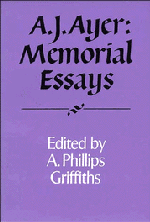Book contents
- Frontmatter
- Contents
- Preface
- A Defence of Empiricism
- Ayer: the Man, the Philosopher, the Teacher
- Ayer's Place in the History of Philosophy
- AYER'S ATTACK ON METAPHYSICS
- Ayer and World Views
- Language, Newspeak and Logic
- On the relation between Common Sense, Science and Metaphysics
- Logical Positivism and Intentionality
- Probability and the Evidence of our Senses
- Seeing Qualia and Positing the World
- Three Varieties of Knowledge
- The Importance of ‘If’
- Ayer's Ethical Theory: Emotivism or Subjectivism?
- Subjectivism and Toleration
- An Interview with A. J. Ayer
- Notes on Contributors
- References
- Index
Three Varieties of Knowledge
Published online by Cambridge University Press: 01 July 2010
- Frontmatter
- Contents
- Preface
- A Defence of Empiricism
- Ayer: the Man, the Philosopher, the Teacher
- Ayer's Place in the History of Philosophy
- AYER'S ATTACK ON METAPHYSICS
- Ayer and World Views
- Language, Newspeak and Logic
- On the relation between Common Sense, Science and Metaphysics
- Logical Positivism and Intentionality
- Probability and the Evidence of our Senses
- Seeing Qualia and Positing the World
- Three Varieties of Knowledge
- The Importance of ‘If’
- Ayer's Ethical Theory: Emotivism or Subjectivism?
- Subjectivism and Toleration
- An Interview with A. J. Ayer
- Notes on Contributors
- References
- Index
Summary
I know, for the most part, what I think, want, and intend, and what my sensations are. In addition, I know a great deal about the world around me. I also sometimes know what goes on in other people's minds. Each of these three kinds of empirical knowledge has its distinctive characteristics. What I know about the contents of my own mind I generally know without investigation or appeal to evidence. There are exceptions, but the primacy of unmediated self-knowledge is attested by the fact that we distrust the exceptions until they can be reconciled with the unmediated. My knowledge of the world outside of myself, on the other hand, depends on the functioning of my sense organs, and this causal dependence on the senses makes my beliefs about the world of nature open to a sort of uncertainty that arises only rarely in the case of beliefs about my own states of mind. Many of my simple perceptions of what is going on in the world are not based on further evidence; my perceptual beliefs are simply caused directly by the events and objects around me. But my knowledge of the propositional contents of other minds is never immediate in this sense; I would have no access to what others think and value if I could not note their behaviour.
Of course all three varieties of knowledge are concerned with aspects of the same reality; where they differ is in the mode of access to reality.
The relations among the three sorts of empirical knowledge, particularly questions of conceptual priority, have long headed the list of philosophers’ epistemological concerns, and they are my subject here.
- Type
- Chapter
- Information
- A. J. Ayer: Memorial Essays , pp. 153 - 166Publisher: Cambridge University PressPrint publication year: 1992
- 36
- Cited by



